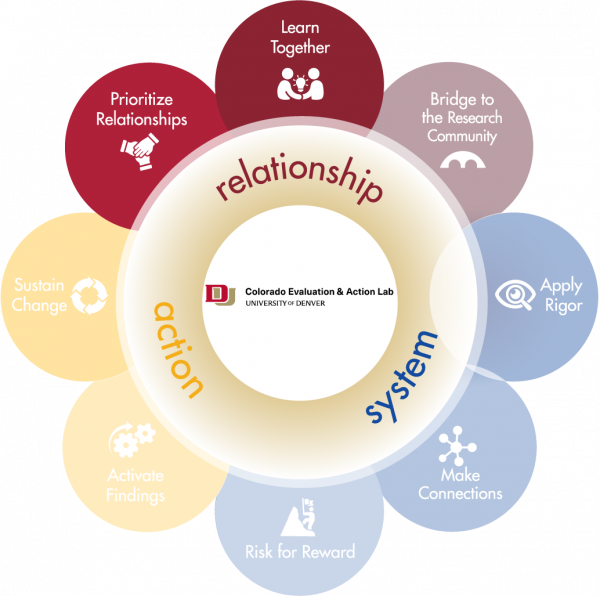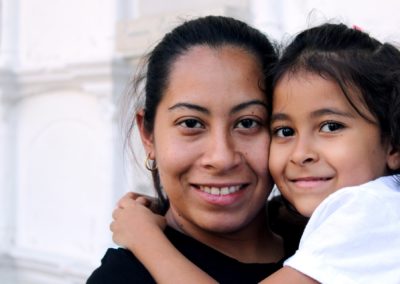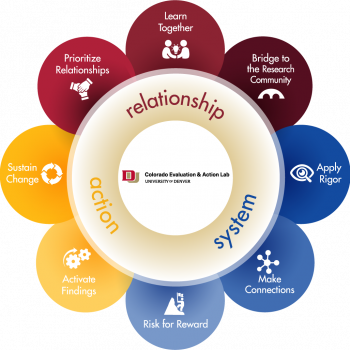
Celebrating the Fifth Anniversary of the Colorado Evaluation and Action Lab!
This is the second post in our special blog series to mark the fifth anniversary of the Colorado Evaluation and Action Lab. In each post, we highlight elements that are essential to our work with a broad range of government and community partners. The effectiveness of the work we undertake together is key to advancing systems and policies that strengthen opportunities to meaningfully improve the lives of Coloradans.
Early on, we learned the importance of meeting our partners where they are. We listen carefully, supporting them to unpack ideas and gain insights on factors—big and small—that might serve to accelerate or shut down learning, improvement, and change efforts. Surfacing these types of details requires trust, which is why our top priority—always—is relationship-building.
Part of relationship-building is learning together with our partners about the data and actions needed to move the needle toward desired outcomes. Using the Colorado Steps to Building Evidence model, we support partners in moving their program, initiative, or collaboration to the evidence level needed to achieve their goals.
In this post, we share an example of what these two relationship-focused essential elements—Prioritize Relationships and Learn Together—look like in practice through our work with the Colorado Office of Respondent Parents’ Counsel.
Office of Respondent Parents’ Counsel
The Colorado Office of Respondent Parents’ Counsel (ORPC) provides high-quality legal advocacy for indigent parents involved in court-involved child welfare proceedings. Building a trusting relationship with the ORPC has been particularly important given the challenging landscape in which parent-centered legal representation exists, including a culture that doesn’t always value parental legal representation, along with political pressures to illustrate how investment in the ORPC makes a meaningful difference in the lives of Colorado children and families.
This is where the Colorado Lab’s work began—collaborating with the ORPC to deeply understand their continuum of representation models and identify the department’s return on investment to Colorado families and systems. Key to the success of the partnership is engaging ORPC staff in the full cycle of evidence-building, from evaluation priorities to co-creation of the research approach to making meaning of early findings and applying those learnings for continuous improvement and strengthening.
Using this collaborative learning approach, we support partners in building evidence to inform effective practices and programs, and nurture and guide them as they set up systems and structures for sustained growth. Together with the ORPC, we are intentionally building their capacity to set goals and effectively use data to inform and achieve those goals—reinforcing the value of an ongoing evidence-based decision-making approach vs. trying to do it all at once. As the work progresses and our relationship grows stronger, we are able to serve as a responsive thought partner, helping staff to move past the very real challenges of examining day-to-day work and understanding how to shore up implementation strategies to strengthen outcomes.
A recent, strong example is ORPC’s success in building evidence for an interdisciplinary team representation model (read more). This model pairs an attorney with a social worker or parent advocate with lived experience to address root causes of child welfare involvement, promote long-term family strengthening, and protect the fundamental right to parent. Interdisciplinary representation is part of a continuum of legal advocacy efforts used to support child and family well-being through high-quality legal representation.

Moving a model such as this through the Steps to Building Evidence requires trusting relationships and a commitment to use data for learning. The ORPC has been working together with the Colorado Lab to build evidence for interdisciplinary representation, beginning at Step 1 and patiently and persistently progressing toward their goal of rigorously illustrating how investment in this model can improve family reunification, promote parental dignity, and reduce long-term fiscal and societal costs of systems involvement. For example, the Colorado Lab produced a roadmap and data-informed recommendations for precision staffing of interdisciplinary teams, alongside clear articulation of roles and responsibilities. This guidance allows the ORPC to more strategically match requests for social workers and parent advocates to unique client needs and promote strengths-based staffing, which in turn can reduce provider burnout, improve coordination, and increase smart resourcing of the model.
The learnings—and the ORPC’s increased capacity to activate learnings—are helping to break cycles of child and parent trauma and keep families together.
For more information about our partnership with and the work of the ORPC, contact Dr. Courtney Everson, Sr. Researcher/Project Director.
In our next Essential Element blog post, we’ll focus on the Colorado Lab’s role in serving as a Bridge to the Research Community.
Please tell us if there is an essential element that stands out to you based on the work we’ve done together. Do you have a story to share? Is there something about the Colorado Lab that you would like to learn more about? What are your hopes for the future of Colorado’s policy lab? We would love to hear from you; a celebration is more fun when it’s shared with those we’re making this journey with!
Email us at admin@coloradolab.org.
